|
|
|
Sort Order |
|
|
|
Items / Page
|
|
|
|
|
|
|
| Srl | Item |
| 1 |
ID:
192177
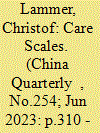

|
|
|
|
|
| Summary/Abstract |
Examining the “world's largest cash-based social policy” through the lens of care reveals widely shared scalar imaginaries and the productivity of care in constituting scale. In standardizing the minimum livelihood guarantee (dibao), officials, applicants and researchers in rural Sichuan cited both “too much” and “not enough” care at the scale of the family in recommending or rejecting state assistance. Different levels of organization (scale1) were not stable bases with specific sizes and qualities (scale2) that enabled or limited care. Dibao-related practices were evaluated as an appropriate (“filial piety”), insufficient (“individualism”) or excessive (“corruption”) amount of family care. Care became an indicator of kinship measurements and a marker of state boundaries. Thus, scale (in both meanings) was enacted in China, as elsewhere, through negotiations of needs and responsibilities, through evaluations of care practices and their outcomes. In this sense, care scales.
|
|
|
|
|
|
|
|
|
|
|
|
|
|
|
|
| 2 |
ID:
083844


|
|
|
| 3 |
ID:
163078
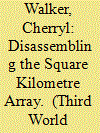

|
|
|
|
|
| Summary/Abstract |
The article poses questions about astronomy and its local, national and global developmental impacts, drawing on ongoing research around the internationally networked Square Kilometre Array (SKA) radio telescope in South Africa. The relationship between progress in global science and technology and societal change has traditionally been framed through western-centric notions of progress imbued with universalism; the field of astronomy exemplifies this approach, with its assumptions of an inherently positive correlation between its science and loosely defined notions of ‘development’. We problematise this assumption through an analysis of the multiple notions of development at different scales of analysis in the SKA. We argue that large astronomy projects such as the SKA are best understood as dense assemblages of science, infrastructure, human agency and politics, in which historically rooted local concerns are marginalised in the name of the national or global public interest.
|
|
|
|
|
|
|
|
|
|
|
|
|
|
|
|
| 4 |
ID:
175358


|
|
|
|
|
| Summary/Abstract |
This introduction provides an overview for the following collection of articles that engage with, and aim to extend, recent scholarship emphasising space as a category of analysis in peace and conflict studies. Attempts to ‘spatialise’ this field of enquiry have emphasised the ways actors and ideas travel and transform across scale (from the personal to the local, regional and global) and how agents, actors and identities constitute, and are constituted by, space and place in dynamics of conflict and peace. Attention to space has increased appreciation of the complex nature of nature of war- and peace-‘scapes’, and reflects upon space as material and symbolic, given meaning through peoples’ embodied activity and interactions. The articles in this issue engage with the foundations of the spatial turn and build upon innovations in spatial analysis of peace and conflict by focussing on the idea of ‘emplacement’ and emplaced security as critical to peacebuilding efforts and processes of conflict transition. To do so, we consider place in a relational sense, focussing on attachment, affective connection and narratives of place-identity as these are connected with conflict management, security, governance and political ordering.
|
|
|
|
|
|
|
|
|
|
|
|
|
|
|
|
| 5 |
ID:
110836
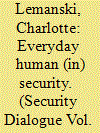

|
|
|
|
|
| Publication |
2012.
|
| Summary/Abstract |
While human security approaches emphasize top-down security concerns and strategies, urban dwellers in the global South experience (in)security in much more immediate and tangible forms, grounded, for example, in citizens' perceptions and fears related to the security of their lifestyles and cultures, as well as their physical, financial and tenure security. Thus, while human security research and policy focuses on security concerns that occur at the global scale, are linked to spectacular events, and result in security strategies that concentrate on collective human needs and state-led responses, citizens' security experiences take place primarily at the local scale, in terms of everyday practices and individual subjectivities, resulting in citizen-led mitigation strategies. The 'gap' between the security agenda's global scale and urban citizens' local scale is the primary focus of this article, which uses empirical examples from the global South to highlight the ways in which urban citizens from diverse socioeconomic groups demonstrate scales of human (in)security that are under-addressed by the conceptual or policy framework. The article concludes with a call to rescale the human security agenda within the context of the Southern city - to consider the local alongside the global.
|
|
|
|
|
|
|
|
|
|
|
|
|
|
|
|
| 6 |
ID:
174828
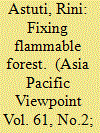

|
|
|
|
|
| Summary/Abstract |
Peatland fires and the impact of transboundary haze are often intertwined with socio‐environmental externalities of neoliberal forest governance and overlapping systems of resource property rights in Indonesia. New peatland governance strategies are emerging to address fires and haze by reorganising peatland management using a more ecologically relevant scale that territorialises peatland according to its hydrological characteristics. Employing the concept of the eco‐scalar fix, this paper interrogates rescaling peatland governance as a strategy to address the socio‐ecological crisis associated with the conversion of peatland into mono‐agricultural land. However, rescaling peatland governance entails the risk of merely displacing socio‐environmental crises to areas considered less ecologically important rather than addressing them. Drawing on a case study of a peatland restoration in Riau, Indonesia, this paper shows how emerging hybrid forms of peatland governance can address the environmental externalities that have unintentionally been created. This hybrid form of peatland governance has pressured actors across multiple types of property to rework the ways that environmental commons are controlled and accessed.
|
|
|
|
|
|
|
|
|
|
|
|
|
|
|
|
| 7 |
ID:
109469
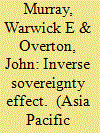

|
|
|
|
|
| Publication |
2011.
|
| Summary/Abstract |
Theories and practices of international aid have stressed the need for the full participation of recipients. This approach has been strengthened by international agreements such as the Paris Declaration on Aid Effectiveness in 2005, which called for 'ownership' of development strategies by recipient agencies. This seemed to promise recipient governments an increased stake in the way aid was used for development and poverty alleviation. However, in practice, the new aid agenda has actually increased demands on recipients with new conditions over the management of aid funds, the setting of development strategies and the meeting of other global obligations. This issue is of particular concern in small Pacific Island states where the small size of government is coupled with increasing demands from donors for consultation, accountability and engagement to create what we argue is an 'inverse sovereignty' effect: despite the rhetoric of ownership and independence, recipient states are actually losing control over their development strategies, policies and programmes.
|
|
|
|
|
|
|
|
|
|
|
|
|
|
|
|
| 8 |
ID:
121110
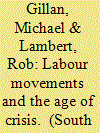

|
|
|
|
|
| Publication |
2013.
|
| Summary/Abstract |
Labour movements, in responding to global crises, are themselves confronted by 'intersecting contradictions' related to differing trade union forms and repertoires of action. In India, unions have been shaped in powerful ways by their historic articulation to state and politics. The scope and framing of union action has been somewhat limited. However, trade unions in India are also in a process of transition and are now more various in their forms, strategies and spatial relations.
|
|
|
|
|
|
|
|
|
|
|
|
|
|
|
|
| 9 |
ID:
191852


|
|
|
|
|
| Summary/Abstract |
This article reflects on the effects of the recent mining boom on the (trans-)formation of the state in D.R. Congo. To do so, it proposes to integrate macro- and micro- approaches to the political economy of mining into a broader analysis of the power practices of actors at different levels of the state apparatus. Taking the copper mining sector as a case study, it explores the various means by which the presidency, provincial authorities and customary chiefs have drawn resources from mining in the period from the early 2000s to the present. This analysis highlights the various resources that state actors at different levels use to assert their authority over foreign mining companies. From a broader perspective, it shows that, although the liberalisation of the mining sector has opened up new revenue opportunities for all these actors, it has not resulted in a significant power redistribution between them.
|
|
|
|
|
|
|
|
|
|
|
|
|
|
|
|
| 10 |
ID:
080007


|
|
|
|
|
| Publication |
2007.
|
| Summary/Abstract |
Departing from tendencies to bound precarity in particular time periods and world regions, this article develops an expansive view of precarity over time and across space. Beyond effects of specific global events and macroscale structures, precarity inhabits the microspaces of everyday life. However, people attempt to disengage the stress of precarious life by constructing the illusion of certainty. Reflexive denial of precarious life entails essentialist strategies that implicitly or explicitly classify and homogenize people and phenomena, legitimize the constructed boundaries, and in the process aim at eliminating difference and possibilities for negotiation; the tension between these goals and material realities helps explain misrepresentations that can be catastrophic at multiple scales, re-creating precarity. Reactions to 9/11 by the Bush administration represent a case in point of reflexive denial of precarity through strategies that created illusions of certainty with deleterious results. Normatively, the paradox of precarious life and reflexive denials prompts questions as to how urges for certainty in the context of precarity might be constructively channeled. the author approaches this challenge in the final section by drawing from a nexus of concerns about post-Habermasian radical democracy, individual thought and feeling, and network dynamics. Whereas Hardt and Negri reverse the direction of the Foucauldian concept of biopower from top-down to bottom-up, the author draws from Foucault's concept of governmentality in relation to resistance to imagine a cooperative politics operating within as well as across scales
|
|
|
|
|
|
|
|
|
|
|
|
|
|
|
|
| 11 |
ID:
121430


|
|
|
|
|
| Publication |
2013.
|
| Summary/Abstract |
This article describes the role of transnational policy entrepreneurs in producing and maintaining the global discourse of river basin organizations- a key element of global water governance. It takes an agency approach and draws on three streams of literature-discourse analysis, political ecology, and political economy-to derive strategies that transnational actors may use to advance discourse. To illustrate agency and strategies, it draws from a wide variety in types of RBOs across the globe. It finds that global knowledge networks exhibit the most expansive reach, serving as the oil in the machine of the global RBO discourse. This finding raises important questions around networks in the broader global water governance discourse as well as compelling questions related to governance.
|
|
|
|
|
|
|
|
|
|
|
|
|
|
|
|
| 12 |
ID:
184429


|
|
|
|
|
| Summary/Abstract |
The emerging and vibrant field of environmental humanities to date has not received considerable attention in Central Asia. In light of the Anthropocene crises, there is a real urgency for maturing this field and investigating the methodological and epistemological challenges that environmental topics demand, often working across disciplinary habits and time scales. This roundtable brings together Central Asianists from a range of backgrounds to discuss the sources and scales of their investigation, their challenges and potential. The contributors discuss how particular kinds of sources such as climate models, archival manuscripts, ethnographic fieldwork and media analyses have been used to understand environmental changes in the region. In what ways do the traditions of scholars’ disciplinary training guide the scale of analysis? Looking toward the future of environmental humanities in Central Asia, this roundtable suggests paths for developing this vital field of enquiry.
|
|
|
|
|
|
|
|
|
|
|
|
|
|
|
|
| 13 |
ID:
174808
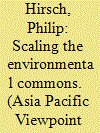

|
|
|
|
|
| Summary/Abstract |
The transboundary environmental commons in Southeast Asia are normally conceived in terms of shared resources and environmental impacts that transcend national borders. The Mekong's ‘fugitive resources’ of water, fish and sediment and the issue of Indonesia's smoke haze drift into Malaysia and Singapore dominate discussion. Assumed national interests shape actors and institutional arrangements for transboundary commons governance. Failure to address the governance challenges is explained in terms of their politico‐cultural failings (e.g. the ‘ASEAN Way’ of non‐interference), the weak regulatory remit of agencies with a specific transboundary governance role (Mekong River Commission), the dominant developmental agenda of subregional cooperative arrangements (Greater Mekong Subregion) or the geopolitical dominance of China (Lancang–Mekong Cooperation). This article builds on these critiques by considering the relationship between the local commons impacted by transboundary projects and the framing of the commons at an inter‐governmental level. It shows that neglect of the local commons and the impacts on them of projects with transboundary effects is partly to be explained by the institutional scaling of the transboundary commons at a country‐to‐country level. It also argues for an expanded notion of transboundary, including investment and governance flows as well as the material environmental footprint of large‐scale investments.
|
|
|
|
|
|
|
|
|
|
|
|
|
|
|
|
| 14 |
ID:
162765
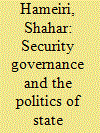

|
|
|
|
|
| Summary/Abstract |
A rapidly growing, self-identified scholarly subfield on “Security Governance” has recently emerged. Its signal contribution has been to explicate the expansion of security governance beyond traditional defense multilateralism to include diverse actors, networked transnationally across multiple scales. However, this literature is predominantly descriptive and evaluative. Lacking an explanatory theory, it struggles to explain security governance outcomes convincingly. This article advances this body of literature by presenting an explanatory theoretical framework, which sees security governance as being produced through struggles over the appropriate scale of governance and the transformation of state apparatuses, shaped by specific state-society and political economy contexts. This framework is used to explain outcomes in the governance of money laundering and terrorist financing in the Asia-Pacific region and in Africa. Contrary to the expectations of Security Governance scholars that states in these regions generally fail to engage in security governance, the case studies illustrate that significant governance innovation has in fact occurred. This innovation is not the result of supranational multilateralization, but of the transformation and partial internationalization of domestic institutions– to an extent determined by local socio-political struggles over governance rescaling. Our framework thus accounts for real world outcomes; explains, rather than merely describes, the functional efficacy of security governance regimes; and enables normative assessment by identifying the winners and losers that emerge out of governance innovation.
|
|
|
|
|
|
|
|
|
|
|
|
|
|
|
|
| 15 |
ID:
088343


|
|
|
|
|
| Publication |
2009.
|
| Summary/Abstract |
This article contributes to current debates about Just War by analysing an insufficiently recognised problem with the way Just War theorists have responded to the two principal challenges surrounding the ethics of violence in international relations since the end of the Cold War - humanitarian intervention and the 'global war on terror'. The problem focuses on strongly embedded assumptions that exist in contemporary Just War debates about the nature and meaning of territory. The article argues that Just War needs to engage more systematically with challenges to dominant 'Westphalian' framings of territory, space and scale in order to contribute more effectively to important ethical debates about the use of violence in international relations.
|
|
|
|
|
|
|
|
|
|
|
|
|
|
|
|
| 16 |
ID:
183712
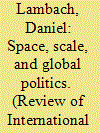

|
|
|
|
|
| Summary/Abstract |
Space matters for global politics but the treatment thereof in International Relations (IR) has been uneven. There is broad interest in spatial aspects across many research communities but only a nascent theoretical discussion and little cross-field communication. This article argues for a fuller engagement of IR scholars with sociospatial concepts and proposes a spatial approach to global politics based on four essential dimensions: a spatial ontology, the constructedness of space, a scalar perspective, and the interaction of materiality and ideas. As one possible way of integrating these aspects into a more specific concept, the article elaborates a framework of spatial practices and uses the example of Arctic Security research to illustrate the upsides of such a spatial approach for IR research.
|
|
|
|
|
|
|
|
|
|
|
|
|
|
|
|
| 17 |
ID:
164042
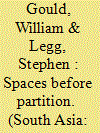

|
|
|
|
|
| Summary/Abstract |
This introduction frames a selection of papers that encourage a richer spatial understanding of the years before the Partition of India. The papers respond to two types of questions. One type is spatial (at what scale do we approach Partition? Through which spaces should we attempt to understand both micro and macro processes? Movements across what distances constituted Partition?). The second type is temporal (what timescales do we invoke when approaching Partition? Of what was it the endpoint? What sort of memories were invoked and made during India’s multiple partitions?). This introduction establishes the main trends in Partition historiography, tracked through the last two decennial anniversaries. It sketches out spatial analyses of Partition to date, regarding territory and displacement especially, but shows that much of this geographical interpretation has been implicit rather than explicit, and that most have begun with Partition. Whilst framing many of their arguments in twentieth-century colonial practice, and occasionally straying into the post-colonial, the papers in this special issue mostly focus on the 1930s–1940s at a range of scales (from the international, through the nation-state, to cities, mohallas and courtrooms). Collectively they make the argument that if Partition has a history, then it also has an historical geography. We hope these papers will help people read these histories and geographies with a finer spatial eye.
|
|
|
|
|
|
|
|
|
|
|
|
|
|
|
|
| 18 |
ID:
184048
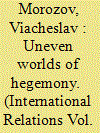

|
|
|
|
|
| Summary/Abstract |
The neo-Marxist literature on uneven and combined development has made significant progress towards a comprehensive theory of the international. Its point of departure is societal multiplicity as a fundamental condition of the international. This article identifies an important lacuna in the ontology of multiplicity: there is no discussion of what constitutes a ‘society’, or the basic entity capable of entering a relationship with other entities. Existing solutions, including those relying on relational sociology, gravitate towards ontological individualism. Building on poststructuralist neo-Gramscian theories, I propose to ground the conceptualisation of ‘society’ in the notion of hegemony. This implies a discursive ontology, which attributes the inside/outside dynamic to hegemonic formations rather than states or societies. Coupled with the understanding of hegemony as a scalar phenomenon, this ontology can account for the primacy of the state in modern times, while also enabling a research focus on other types of collectivities.
|
|
|
|
|
|
|
|
|
|
|
|
|
|
|
|
| 19 |
ID:
142573
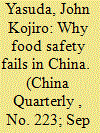

|
|
|
|
|
| Summary/Abstract |
This article examines food safety failures in China to cast light on how scale has deeply affected its regulatory politics. Contrary to studies that view China's food safety challenges as primarily resulting from corruption, local obstructionism or weak state capacity, I argue that China's massive production system, unwieldy bureaucracy, and geographic size pose regulators with a more fundamental policy challenge. As they attempt to build an integrated national regulatory regime, regulators must make difficult trade-offs in cost, policy design and applicability that emphasize the interests of certain stakeholders over others, resulting in a contentious “politics of scale.” The article assesses four failed scale management initiatives: food safety coordination bodies, campaigns, model production zones, and regulatory segmentation. As China transitions to scientifically assessed, risk-based forms of regulation, its pervasive food safety problem suggests the adaptive limits of China's unitary regulatory structure to manage scale and its ensuing politics effectively in a complex multilevel context.
|
|
|
|
|
|
|
|
|
|
|
|
|
|
|
|
|
|
|
|
|